| Buchhandlung Heesen | Versandbuchhandlung für Evangelische Theologie |
Impressum | |
| Freudenstadt / Loßburg | Datenschutzhinweise | ||
| Tel. 07446 952 418 1 | Buchhandlung.Heesen@t-online.de | ||
| Da unsere Angebote manuell erstellt werden und während des Seitenaufrufes keine Verbindung zu einer Buchdatenbank aufgebaut wird prüfen wir die Verkaufspreise bei Rechnungsstellung auf Richtigkeit und berechnen den gesetzlich festgelegten Buchpreis. Falls sich dadurch eine Preiserhöhung ergibt werden wir Sie vor Versand informieren, Sie können dann diesem Preis zustimmen oder vom Kauf zurücktreten. Hinweise zum Datenschutz und Cookies | |||
| Judaism, Christianity, and Islam – Tension, Transmission, Transformation, de Gruyter | |||
| Judaism, Christianity, and Islam - Tension, Transmission, Transformation (JCIT) brings together innovative volumes exploring the reception and mediation of ideas and practices in the three monotheistic traditions of Judaism, Christianity, and Islam, from antiquity to the twenty-first century. Monographs, collected works, text editions, and bibliographic databases address their intertwining relations in various historical and geographical contexts. The series is intentionally interdisciplinary, inviting proposals across disciplines dealing with at least two of these three religions. Among the research areas to be studied are, for example, Greek, Hebrew, Syriac, Arabic, Latin, and Ottoman cultural spheres; the Enlightenment and modernity in various contexts; imperialism, colonialism, postcolonialism, and globalization. Attention is given to exegesis and intertextuality, political models and patterns of social order, spiritual symbols and images, scholarly interactions and mystical experiences. The series is relevant to scholars as well as to those interested and engaged in interreligious exchange. | |||
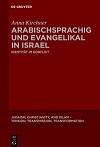 |
Anne Kirchner Arabischsprachig und evangelikal in Israel Identität im Konflikt De Gruyter, 2021, 307 Seiten, Hardcover, 978-3-11-073883-4 102,95 EUR |
Judaism, Christianity, and Islam – Tension, Transmission, Transformation
Band 18 Arabischsprachige Evangelikale in Israel stehen in einem komplexen Identitätskonflikt: Sie sind israelisch, aber nicht jüdisch, arabisch und palästinensisch, aber nicht muslimisch, christlich, aber nicht traditionell-christlich, sondern evangelikal. Diesen Identitätskonflikt untersucht die Studie mittels in Nazareth erhobener ethnographischer Daten, die sie auf ihre Vorgeschichte und globale Verflechtung hin befragt. Sie zeigt auf, dass sich die arabischsprachigen Evangelikalen in Israel mit ihrer Hervorhebung des Glaubens und intensiven Frömmigkeit nicht dem Konflikt und der Welt entziehen, sondern eine aktive Kritik vorbringen, insbesondere an dem christlich-evangelikalen Zionismus und der Politisierung von Religion in Israel. Damit eröffnet die Studie neue Perspektiven auf Religion und Nation in Israel und das Verhältnis von Politik und Religion. |
|
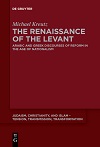 |
Michael Kreutz The Renaissance of the Levant De Gruyter, 2019, 186 Seiten, Gebunden, 978-3-11-063122-7 94,95 EUR |
Michael Kreutz The Renaissance of the Levant De Gruyter, 2020, 186 Seiten, Softcover, 978-3-11-064356-5 20,95 EUR |
Judaism, Christianity, and Islam – Tension, Transmission, Transformation
Band 13 Sprache: Englisch Arabic and Greek Discourses of Reform in the Age of Nationalism Since the Mediterranean connects cultures, Mediterranean studies have by definition an intercultural focus. Throughout the modern era, the Ottoman Empire has had a lasting impact on the cultures and societies of the Southern and Eastern Mediterranean. However, the modern Balkans are usually studied within the context of European history, the southern Mediterranean within the context of Islam. Although it makes sense to connect both regions, this is a vast field and requires a command of different languages not necessarily related to each other. Investigating both Greek and Arabic sources, this book will shed some light on the significance of ideas in the political transitions of their time and how the proponents of these transitions often became so overwhelmed by the events that they helped trigger adjustments to their own ideas. Also, the discourses in Greek and Arabic reflect the provinces of the Ottoman Empire and it is instructive to see their differences and commonalities which helps explain contemporary politics. Blck ins Buch |
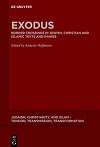 |
Exodus De Gruyter, 2021, 259 Seiten, Softcover, 978-3-11-064275-9 20,95 EUR |
Judaism, Christianity, and Islam – Tension, Transmission, Transformation
Band 11 Sprache: Englisch Border Crossing in Jewish, Christian and Islamic Texts and Images The scientific debates on border crossings and cultural exchange between Judaism, Christianity, and Islam have much increased over the last decades. Within this context, however, little attention has been given to the biblical Exodus, which not only plays a pivotal role in the Abrahamic religions, but also is a master narrative of a border crossing in itself. Sea and desert are spaces of liminality and transit in more than just a geographical sense. Their passage includes a transition to freedom and initiation into a new divine community, an encounter with God and an entry into the Age of law. The volume gathers twelve articles written by leading specialists in Jewish and Islamic Studies, Theology and Literature, Art and Film history, dedicated to the transitional aspects within the Exodus narrative. Bringing these studies together, the volume takes a double approach, one that is both comparative and intercultural. How do Jewish, Christian and Islamic texts and images read and retell the various border crossings in the Exodus story, and on what levels do they interrelate? By raising these questions the volume aims to contribute to a deeper understanding of contact points between the various traditions. |
|
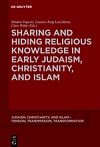 |
Mladen Popovic Sharing and Hiding Religious Knowledge in Early Judaism, Christianity, and Islam De Gruyter, 2018, 210 Seiten, Gebunden, 978-3-11-059571-0 86,95 EUR |
Mladen Popovic Sharing and Hiding Religious Knowledge in Early Judaism, Christianity, and Islam Softcover De Gruyter, 2020, 210 Seiten, Softcover, 978-3-11-064373-2 20,95 EUR |
Judaism, Christianity, and Islam – Tension, Transmission, Transformation
Band 10 Sprache: Englisch Few studies focus on the modes of knowledge transmission (or concealment), or the trends of continuity or change from the Ancient to the Late Antique worlds. In Antiquity, knowledge was cherished as a scarce good, cultivated through the close teacher-student relationship and often preserved in the closed circle of the initated. From Assyrian and Babylonian cuneiform texts to a Shi'ite Islamic tradition, this volume explores how and why knowledge was shared or concealed by diverse communities in a range of Ancient and Late Antique cultural contexts. From caves by the Dead Sea to Alexandria, both normative and heterodox approaches to knowledge in Jewish, Christian and Muslim communities are explored. Biblical and qur'anic passages, as well as gnostic, rabbinic and esoteric Islamic approaches are discussed. In this volume, a range of scholars from Assyrian studies to Jewish, Christian and Islamic studies examine diverse approaches to, and modes of, knowledge transmission and concealment, shedding new light on both the interconnectedness, as well as the unique aspects, of the monotheistic faiths, and their relationship to the ancient civilisations of the Fertile Crescent. |
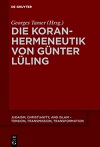 |
Georges Tamer Die Koranhermeneutik von Günter Lüling De Gruyter, 2018, 233 Seiten, Gebunden, 978-3-11-059812-4 89,95 EUR |
Judaism, Christianity, and Islam – Tension, Transmission, Transformation
Band 9 Der koranhermeneutische Ansatz des Islamwissenschaftlers Günter Lüling wurde jahrzehntelang von Fachvertretern totgeschwiegen, was Nahrung für Verschwörungstheorien lieferte. Seine Theorie, dass der Koran seinen Ursprung im alten Christentum habe, widersprach der traditionellen Wissenschaft seiner Zeit. Der Band enthält Forschungsbeiträge, in denen Lülings Werk erstmals kritisch gewürdigt wird. |
|
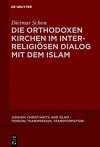 |
Dietmar Schon Die orthodoxen Kirchen im interreligiösen Dialog mit dem Islam De Gruyter, 2017, 634 Seiten, Gebunden, 978-3-11-054477-0 119,95 EUR |
Judaism, Christianity, and Islam – Tension, Transmission, Transformation Band 7 Interreligiöser Dialog mit dem Islam gilt in einer globalisierten Welt als unverzichtbar, um friedliche Koexistenz von Menschen unterschiedlicher Religion zu sichern. Auch die orthodoxe Kirche hat sich im interreligiösen Dialog engagiert und zu einem Miteinander der Religionen beigetragen. Die Studie beleuchtet unmittelbar die in ökumenischem Kontext entstandenen Beiträge der autokephalen orthodoxen Kirchen seit den 1980er Jahren bis heute. Inhaltsverzeichnis |
|
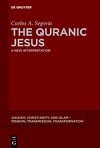 |
Carlos A. Segovia The Quranic Jesus A New Interpretation De Gruyter, 2018, 200 Seiten, Gebunden, 978-3-11-059764-6 86,95 EUR |
Carlos A. Segovia The Quranic Jesus A New Interpretation, De Gruyter, 20208, 200 Seiten, Softcover, 978-3-11-064361-9 20,95 EUR |
Judaism, Christianity, and Islam – Tension, Transmission, Transformation
Band 5 Sprache: Englisch Is it possible to rethink the multilayered and polyvalent Christology of the Qur’an against the intersecting of competing peripheral Christianities, anti-Jewish Christian polemics, and the making of a new Arab state in the 7th-century Near East? To what extent may this help us to decipher, moreover, the intricate redactional process of the quranic corpus? And can we unearth from any conclusions as to the tension between a messianic-oriented and a prophetic-guided religious thought buried in the document? By analysing, first, the typology and plausible date of the Jesus texts contained in the Qur’an (which implies moving far beyond both the habitual chronology of the Qur’an and the common thematic division of the passages in question) and by examining, in the second place, the Qur’an’s earliest Christology via-à-vis its later (and indeed much better known) Muhamadan kerygma, the present study answers these crucial questions and, thereby, sheds new light on the Qur’an’s original sectarian milieu and pre-canonical development. |
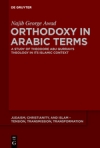 |
Najib George Awad Orthodoxy in Arabic Terms A Study of Theodore Abu Qurrah’s Theology in Its Islamic Context de Gruyter, 2015, 450 Seiten, Gebunden, 978-1-61451-567-8 109,95 EUR |
Judaism, Christianity, and Islam – Tension, Transmission, Transformation
Band 3 This volume represents the first in-depth, analytical and systematic study of the core components and theological rationale of Theodore Abu Qurrah's apologetic discourses in conversation with Islam, with specific attention to his writings on the Trinity and Christology. It explores the question of whether, in conveying orthodoxy in Arabic to the Muslim reader, Abu Qurrah diverged from doctrinal Christian theology and compromised its core content. |
|
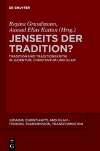 |
Regina Grundmann Jenseits der Tradition? Tradition und Traditionskritik in Judentum, Christentum und Islam de Gruyter, 2014, 300 Seiten, Gebunden, 978-1-61451-539-5 89,95 EUR |
Regina Grundmann Jenseits der Tradition? Tradition und Traditionskritik in Judentum, Christentum und Islam de Gruyter, 2016, 300 Seiten, Broschur, 978-1-61451-681-1 24,95 EUR |
Judaism, Christianity, and Islam – Tension, Transmission, Transformation
Band 2 Sprache: Deutsch Der interdisziplinäre Band versammelt aktuelle Forschungsperspektiven auf das Wechselspiel von Tradition und Traditionskritik in Judentum, Christentum und Islam. Beleuchtet werden die vielfältigen historischen und gegenwärtigen Formen von Kritik an den überlieferten Traditionen sowie die dynamischen Prozesse, die diese Kritik in den Religionen ausgelöst hat. Traditionskritik erweist sich demnach als integraler Bestandteil von religiösen Traditionen. |
|
Bettina Koch Patterns Legitimizing Political Violence in Transcultural Perspectives de Gruyter, 2015, 212 Seiten, Gebunden, 978-1-61451-539-5 89,95 EUR |
Judaism, Christianity, and Islam – Tension, Transmission, Transformation
Band 1 Islamic and Christian Traditions and Legacies Sprache: Englisch This volume explores theoretical discourses in which religion is used to legitimize political violence. It examines the ways in which Christianity and Islam are utilized for political ends, in particular how violence is used (or abused) as an expedient to justify political action. This research focuses on premodern as well as contemporary discourses in the Middle East and Latin America, identifying patterns frequently used to justify the deployment of violence in both hegemonic and anti-hegemonic discourses. In addition, it explores how premodern arguments and authorities are utilized and transformed in order to legitimize contemporary violence as well as the ways in which the use of religion as a means to justify violence alters the nature of conflicts that are not otherwise explicitly religious. It argues that most past and present conflicts, even if the discourses about them are conducted in religious terms, have origins other than religion and/or blend religion with other causes, namely socio-economic and political injustice and inequality. Understanding the use and abuse of religion to justify violence is a prerequisite to discerning the nature of a conflict and might thus contribute to conflict resolution. |
||